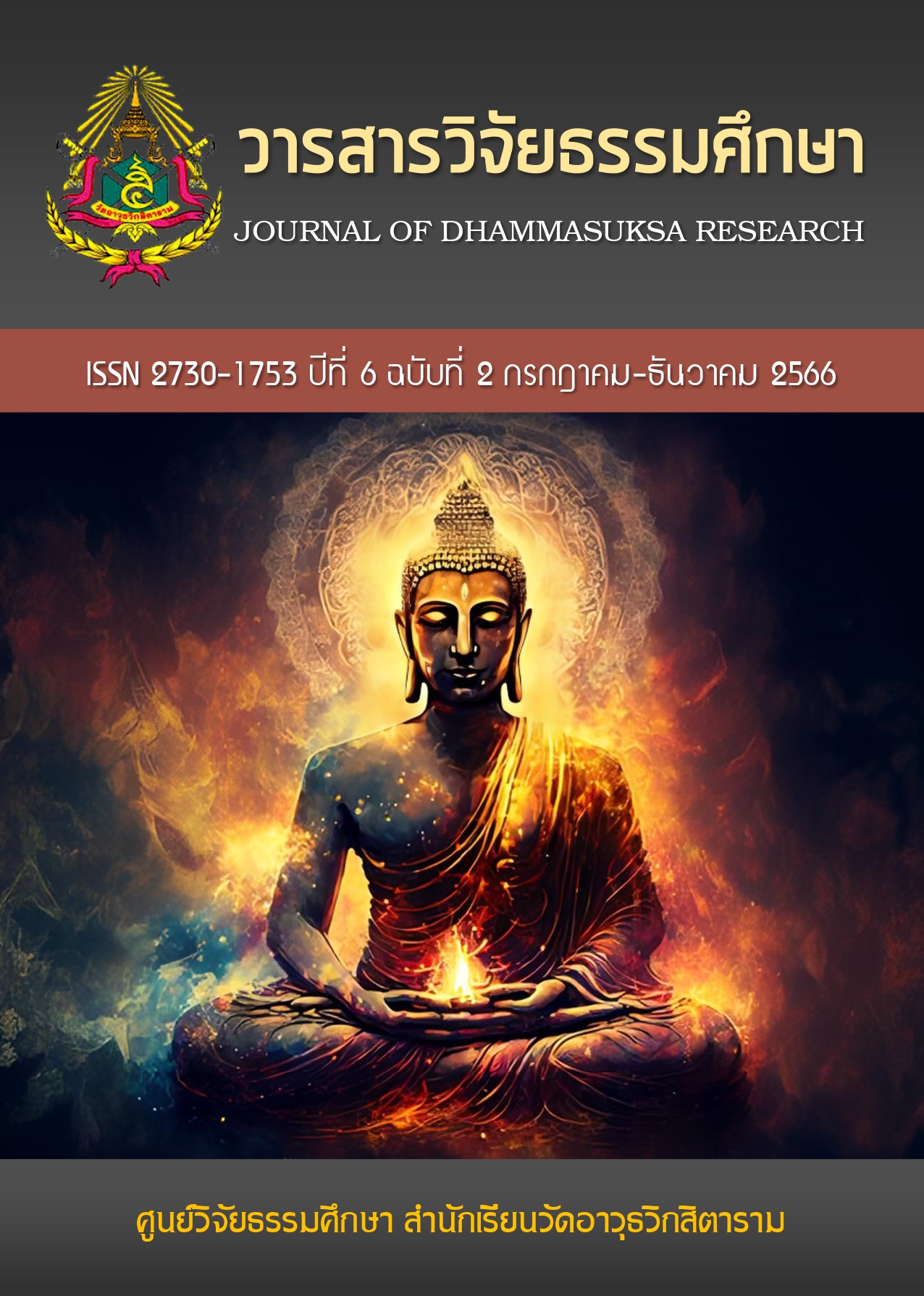THE TRAINING MODE OF INDIVIDUALIZED TALENTSIN FIRST-CLASS UNIVERSITIES
คำสำคัญ:
First-class Universities, Personalized talent training, constituent elements, effective guidanceบทคัดย่อ
The purpose of this study is to: (1) Determine the components of the effectiveness of the personalized talent training model of first-class universities (2) Formulate effective guidance methods for personalized talent training in first-class universities.
The research method is a mixed methods research design, including quantitative research and qualitative research. Obtained by stratified random sampling technique. The research results show that: (1) Components of the effectiveness of personalized talent training in first-class universities The effectiveness has eight components, including the concept of talent training, the mode of professional setting, the method of curriculum setting, the teaching system, the teaching organization form, and the teaching management mode, invisible course form, teaching evaluation method. (2) There are 18 guidelines for the effectiveness of personalized talent training in first-class universities, including 4 guidelines for the effectiveness of talent training concepts; 2 guidelines for the effectiveness of professional setting models; guidelines for the effectiveness of curriculum setting methods; There are 2 effectiveness guidelines for the teaching system; 2 effectiveness guidelines for the teaching organization form; 2 effectiveness guidelines for the teaching management model; 1 effectiveness guide for the invisible course form; 3 effectiveness guidelines for teaching evaluation methods.
เอกสารอ้างอิง
Amabile, T. M. (1983). The Social Psychology of Creativity. New York: Cambridge University.
Anieo, J. A. (2003). Teacher and student relationships for improvements in creativity. Nashville: Peabody College of Widerbilt University.
Ashby, E. (1958). Technology and the academics. London: Macmillan.
Bell, R. E. (2005). Present and future in higher education. London: Tavistock.
Bentinek-Smith, W. (1986). The Harvard Book. 350 Anniversary Edition. Harvard: Harvard University Press.
Berlin, I. (1991). The Crooked Timber of Humanity: Chapters in the history of Ideras. New York: Princeton University Press.
Boyei, E. L. (1987). College: The Undergraduate Experience in America. New York: Harper and Row.
Cassirer, E. (1985). Theory of Man. Y. Gan, Trans. Shanghai: Shanghai Translation Publishing House.
Cha, Y. L. (1998). Educational Modeling. Nanning: Guangxi Education Press.
Clark, B. (1992). The encyclopedia of higher education. Oxford: Pergamon Press.
Conant, J. B. (1945). General Education in a Free society, Report of the Harvard Committee with an Introduction. Harvard: Harvard University Press.
Dong, Z. F. (2009). Sociology of Education. Wuhan: Central China Normal University Press.
Dong, Z. F., & Tao, N. X. (2010). Theory and Practice of Higher Education Diversion. Wuhan: Central China Normal University Press.
Davis, C. (2011). Realizing Our Potential. Higher Education Review, (5), 22-31.
Fanelli, A. (1997). General education in the America college. The state university of New Jersey.
Gardner, H. (1993). Creating Minds: An anatomy of creativity seen through the lives of Freud, Einstein, Picasso, Seravinsk Eliot, Graham, and Ghandi. New York: Basic Books.
Gordon, V. N., & Steele, G. E. (1992). Advising major-changers: Students in transition. NACADA Journal, 12(1), 22-27.
Guilford, J. P. (1967). The Nature of Human Intelligence. New York: McGraw-Hill.
Harvard University. (1994). Introduction to the Core Curriculum: a Guide for Freshmen. Cambridge University Press.
Howard, C. (1992). Theories of general education. New York: Macmillan
Jaspers, K. T. (1991). What is Education. J. Zou, Trans. Beijing: Sanlian Publishing House.
Jin, Y. J. (2008). The concept of university. Beijing: Sanlian Publishing.
Lu, J. (2001). Transcendence and Innovation. Beijing: People's Education Press.
Lin, C. D., & Shen, D. L. (1996). Psychology of Creativity. Hangzhou: Zhejiang People's Publishing House.
Livingstone, R. (1945). The future in education. Cambridge: Cambridge University Press.
Maritain, J. (1960). Education at the Crossroads. New Haven: Yale university Press.
Moberly, W. H. (1995). The University and Cultural Leadership. London: Oxford University Press.
Morison, S. E. (1994). Three Centuries of Harvard: 1636-1936. New York: Harvard University Press.
Newman, J. H. (2001). The ideal of the university. H. Xu, Trans. Hangzhou: Zhejiang Education Press.
Noil, R. G. (1997). Challenges to Research universities. Washington: Brooking Institution Press.
Pratt, M. I. (1992). Humanities for the future: reflections on the western culture debate at Stanford. Duke: Duke University Press.
Rowe, S. C. (1994). Claiming a liberal education: resources for realizing the college experience. Needham Heights: Ginn Press.
Segal, M. (2001). Creativity and personality type: Tools for understanding and inspiring the many voices of creativity. Bromley: Telos Publications.
Smith K. Making an Good Art of Assessment Form [J]. Higher education review, 2012 (l).
Soares, J. A. (1999). The Decline of the Privilege: the Modernization of the Oxford University. Stanford: Stanford University Press.
Trow, M. (1973). Problems in the transition from elite to mass higher education. Berkeley: Carnegie Commission on Higher Education.
UNESCO International Commission on Education for the 21st Century. (1996). Education-the wealth in it. Beijing: Education Science Press.
UNESCO International Commission for Educational Development. (1996). Learning to Survive-Today and Tomorrow in the Educational World. Beijing: Education Science Press, 1996.
Veysey, L. R. (1974). The Emergence of the American University. Chicago: University of Chicago Press.
Wang, H. C. (2004). Theory of Mass Higher Education: A Study of Cultural Individuality of Higher Education Popularization. Guangzhou: Guangdong Education Press.
Wang, D. J., & Guo, W. A. (2009). Pedagogy. Beijing: People's Education Press.
Wang, D. J., & Guo, W. A. (2005). Theory of Subject Education. Beijing: People's Education Press.
Weinhua, N. (2003). Individual and environment influences on Chinese student creativity. Yates: Yates University.
Zhao, X. L., & Wang, C. X. (1980). Selected Works on Dewey Education. Shanghai: East China Normal University Press.
ดาวน์โหลด
เผยแพร่แล้ว
รูปแบบการอ้างอิง
ฉบับ
ประเภทบทความ
หมวดหมู่
สัญญาอนุญาต
ลิขสิทธิ์ (c) 2023 วารสารวิจัยธรรมศึกษา

อนุญาตภายใต้เงื่อนไข Creative Commons Attribution-NonCommercial-NoDerivatives 4.0 International License.



